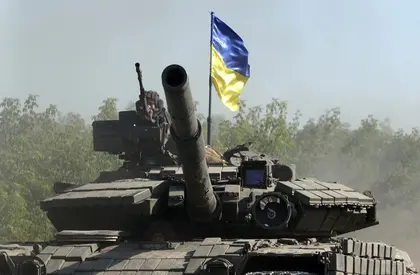“His head was mostly blown-off. It was only because of his spine and some of his teeth that his brother, Vitaly, was able to identify him,” Hanna Hniedkova recounts how her father Pavel died.
Prior to the war, Pavel Hniedkov lived with his family in the Donetsk region, where most of the population is Russian-speaking and have ethnically Russian surnames.
JOIN US ON TELEGRAM
Follow our coverage of the war on the @Kyivpost_official.
“He never spoke in Ukrainian. Not to us; not to his grandkids. He was a Russian-speaker,” Hniedkova said. “He could understand the language, and he would watch Ukrainian television, not Russian, but it was never ‘his language.’”
And yet, Pavel had told his loved ones that if Russia ever invaded Ukraine, he would fight to defend his country.
According to his relatives, Pavel lived a normal life. Like most men of his generation, he had served in the Soviet Army and then spent decades as a welder at the Druzhkivka Machine Building Plant, a little more than 40 kilometers west of Bakhmut, welding parts for mining equipment for coal mining.
Restless at seeing Russia encroaching kilometers into Ukraine, on Feb. 25, 2022, the day after the full-scale invasion began, at age 56, Pavel Hniedkov, with his brother Vitaly, 52, volunteered to take up arms. They were assigned to the 109th Brigade, which is composed of Russian-speaking residents of the Donbas.
With their Donbas comrades, after a couple of months of training, they were sent to patrol Sloviansk where they took part in active combat. They were then sent from northeast Donetsk region to the city of Lyman, where they were greeted with intense firefights.

Ukraine Conducts Nationwide Raids Over Illegal Weapons Trade
On Sept. 20, the brothers’ unit was overrun by artillery fire. Vitaly saw his brother take a direct hit from enemy artillery.
The city for which they were fighting was liberated shortly thereafter, but Vitaly was never the same.
“We thought he’d had a stroke,” said one family member. The younger brother had lost his ability to speak and would stare into the abyss during the months he spent as an in-patient in a mental hospital.
His daughter says that neither brother had strong political views, but were influenced by their own mother’s stories of growing up with her seven siblings. Due to the Soviet collectivization policies, which had led directly to an artificial famine with millions starving to death, only two of the children survived to adulthood.
As the battlelines were moving quickly last year, uncertain what the future held, his family buried Pavel outside of Kyiv, in Brovary.
But why would an ethnic Russian, living in the Donetsk region of Ukraine, die for Ukraine?
The deceased’s wife, Halyna, says that her husband felt compelled to fight, as he was honest and loved his family, “so he went to fight for our future.”
You can also highlight the text and press Ctrl + Enter










